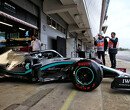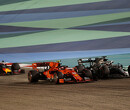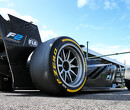Mercedes says that the new technical regulations for 2019 could present a threat to its dominance in Formula 1. This year, downforce has been reduced in order to allow the cars to get closer together on the track and produce better racing.
In recent years, the high levels of downforce have meant that the cars produce more dirty air, which makes it difficult for a following car to stay close. On Wednesday, the Silver Arrows presented the Q10 in a revised livery but is keeping on its toes when it comes to its potential.
“Regulation changes are both opportunity and threat,” said technical director James Allison. “They are an opportunity because all the old assumptions about what you need to have to be quick are swept away and, if you are fleet of foot and smart in dealing with that, you can do better than all the other teams that are tackling the same change.
"They are a threat because if you are not as smart and you didn’t see how to make the most of these new regulations, then you’ll certainly suffer in the coming season. But they are always exhilarating because you have that sharp sense of anxiety that you might not be doing enough but equally the thrill and excitement of looking forward to finding out.”
While the aerodynamic regulations have changed for this year, the engine rules have remained largely stable. Mercedes has revealed that it has made a number of changes to its engine design for the 2019 season.
“We’ve made changes to the cooling architecture of the Power Unit, which hopefully provide aerodynamic benefit on the car and also provide efficiency benefit on the Power Unit – so, hopefully a win on both the chassis and on the Power Unit,” said the team's head of engine performance Andy Cowell.
“The fuel is right at the heart of the combustion and making sure that the chemical composition and the thermodynamic architecture of the power unit are working together exceptionally well is key to thermal efficiency.
"Petronas have continued to work well with our thermodynamic engineers, we’ve run many candidates on the single cylinder and on the V6 engine to derive a new fuel for 2019. It’s a very tight-knit group, the Petronas engineers know exactly how the engine works and our power unit engineers know exactly how the fuel works.
"Petronas also provide the lubricants for our car which play two roles: to make sure that components don’t contact, it’s key that there is an oil film between highly loaded components both for reliability and for friction reduction. If you can keep components apart the friction is lower, and the wear is lower, but the lubricant also provides cooling within the engine. It’s a critical element of the engine, it’s the lifeblood of the engine for its survival.”

 0
0





















Replies (0)
Login to reply